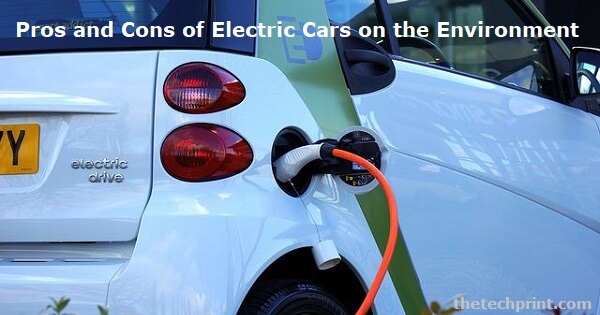Electric cars are doubtlessly a better alternative than gasoline or diesel cars. They are not as polluting as gasoline-powered cars and don't produce emissions. EVs include plug-in hybrids, which can charge their batteries from the grid, and all-electric vehicles with no gasoline engine must be plugged into recharge. But the two-way theory pushes many to think about the actual pros and cons of electric cars on the environment.
Though the EVs emit a lower amount of greenhouse gases than their counterparts, the question of how eco-friendly they are remain unanswered. That includes emissions from generating electricity to charge them and how much their manufacturing harm the environment. Electric vehicles have lower emissions of other pollutants, such as smog-forming nitrogen oxides, but eventually, the damage is done to the ecosystem.
The following are some of the pros of electric cars on the environment:
One of the main advantages of electric cars is that they produce zero emissions. This is fantastic news for the environment, as it helps reduce air pollution and combat climate change.
Electric cars are cheaper than petrol or diesel cars since you only need to charge them up rather than buying/refilling fuel. This saving can be even more significant if you have solar panels installed at your home, as you can effectively 'fuel' your car for free.
Noise pollution reduced almost to zero is one of the many pros of electric cars on the environment. EVs are much quieter than traditional petrol or diesel cars. This means less noise pollution in built-up areas, improving the quality of life for residents.
Electric cars can help encourage the use of renewable energy, as they provide a way to store and use surplus electricity from solar and wind power. This is particularly beneficial if you have solar panels installed, as you can make the most of free energy from the sun.
Not all the electric cars are constructed the same; nevertheless, many of today's newest models have interior components comprised of reusable materials, such as seats, door trim panels, and dash. According to BMW, a quarter of the inside of its electric i3 automobile is composed of recycled plastics and renewable resources - while 95 percent can be recycled.
When these materials are taken apart and salvaged after a car's existence, they may be recycled environmentally responsible. The batteries that power electric vehicles can also be recycled. It can still be utilized elsewhere when a battery wears out since it will still have around 70-80% of its original energy capacity.
While electric cars are better for the environment, they still have drawbacks. Perhaps you should consider alternatives to owning a car if you want to make the most of your efforts - such as car sharing? There are some other potential cons of electric cars on the environment you must consider.
One of the main disadvantages of electric cars is that they have a limited range compared to petrol or diesel cars. You may need to charge them more often, which takes time and effort.
Another drawback of electric cars is that they can be more expensive than traditional petrol or diesel cars. However, this cost is offset because they're cheaper to run long-term.
From manufacturing to disposal of batteries, there are serious cons of electric cars on the environment to consider. Electric cars rely on batteries to power them, which can negatively impact the environment. Batteries contain harmful chemicals and metals, which can leak into the environment if they're not disposed of properly.
Electric cars, like all automobiles, still emit toxic fumes thanks to their batteries. The majority of the electricity utilized in electric vehicles is produced through non-renewable energy sources, which has a detrimental influence on our health and the environment.
To obtain a comprehensive understanding of how much greenhouse gas is produced during the production of an electric automobile, you must examine how its components are obtained and produced. The car's raw materials must be mined, and mining generates a lot of greenhouse gases. Then the raw materials have to be purified before they can be utilized, which releases additional greenhouse gases. In the manufacturing process, even more, greenhouse gas is released.
When it comes to producing petrol or diesel automobile, of course, all of the above is true. In reality, making petrol or diesel automobiles emits approximately 7 to 10 tonnes of CO2 during manufacturing.
Conclusion
Electric cars are definitely more environmentally friendly than gas-powered cars, but they also have an environmental cost that needs to be taken into account. If you’re looking to reduce your carbon footprint, switching to an electric car is a great way to do it, but we need to continue working on developing renewable energy sources if we want to make a real difference.

Although electric cars do not emit exhaust gases, they use batteries, which can produce hazardous fumes. The majority of the energy used for electric power vehicles is generated from non-renewable resources, which have a detrimental influence on human health and the environment.
To date, battery-powered vehicles have not been able to compete with conventional gasoline cars in terms of performance and cost, owing to various factors (car companies trying to recoup research and development expenditures, lack of significant government incentives to induce demand, costly battery packs). This is an obstacle for a lot of customers.
Electric cars have a smaller environmental footprint throughout their entire life cycle. In the production process, electric vehicles produce significantly more global warming emissions than normal gasoline vehicles because electric car batteries require a lot of materials and energy to create.
When an electric vehicle battery catches fire, it emits potentially deadly fumes that may cause a blast.
However, those batteries and the potentially hazardous pollutants that can leak from them might end up in toxic waste dumps over time. There are no EV-battery recycling operations in California, and just five of them are operating nationwide.